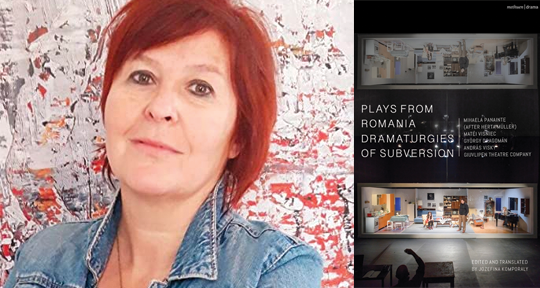This week, our editors bring us news from their respective literary horizons and the many exciting publications being released to the delight of readers. In Spain, Romanian literature hits the spotlight as a the first text of a new series is released, covering the nineteenth century through to World War II. In Nicaragua, the lauded poet and author Gioconda Belli has announced her latest work. Read on to find out more!
MARGENTO, Editor-at-Large, reporting from Spain
Within international contexts, the most important literary event of the past few months is the release of Grandes escritores rumanos (Great Romanian Writers), a collection edited by Alba Diz Villanueva and past Asymptote contributor Felix Nicolau, and published by Huerga & Fierro (Madrid, Spain). The anthology is the first instalment of a series projected to cover Romanian literature chronologically, and samples the second half of the nineteenth century and early twentieth century, through to World War II. Numbering over three hundred pages, it starts off with both the original and the Spanish translation of the “great [three] Romanian classics”: the eruditely eclectic, formally exhaustive Renaissance man and “national poet,” Eminescu; the proverbially language-bending, comedic, and politically sarcastic playwright and short-story writer Caragiale (whom Eugène Ionesco referred to as his master, making him the true forerunner of the theatre of the absurd); and the linguistically-Gargantuan, (faux-)folkloric raconteur, Creangă. Among the featured twentieth century writers are the paradoxically modernist-traditionalist poet Tudor Arghezi, modernist-expressionist poet and philosopher Lucian Blaga, iconic Symbolist George Bacovia, landmark novelists Mihail Sadoveanu and Liviu Rebreanu, alongside significant women poets and fiction writers including Magda Isanos, Hortensia Papadat-Bengescu, Henriette Yvonne Stahl, and Cella Serghi.
An impressive number of translators contributed to this literary tour de force—no less than sixteen—and the editors have structured the collection in a quite complex and polyvalent way. The subtitle reads Antología didáctica (course reference book), and indeed, in a Norton-anthology style, every section comes with a short introduction presenting each writer’s main stylistic features and contextualizing their contribution to the evolution of Romanian letters. Even more distinctively, at the back are quizzes addressing the writers’ style and language, as well as a rich “Further Reading” section providing more detailed bios, aesthetic commentary, and relevant historical background—plus comprehensive annotated bibliographies which act as a great resource for students but also scholars and literati, as they highlight the richness of relevant translations and criticism in both Romanian and Spanish (in Spain and Ibero-America). READ MORE…


